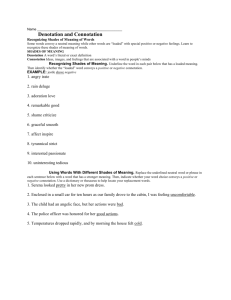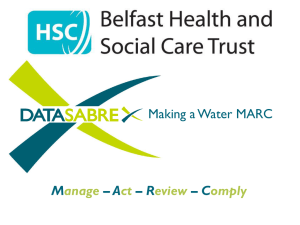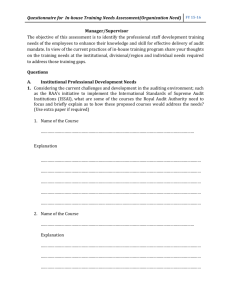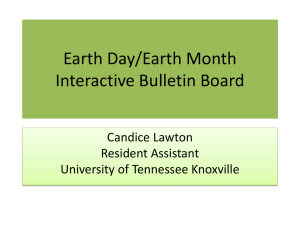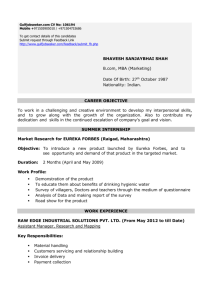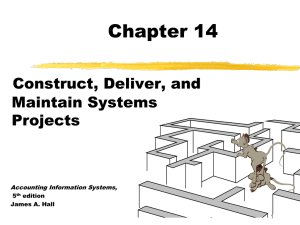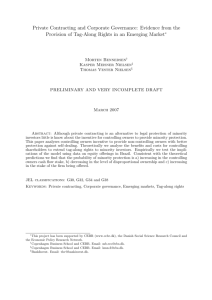Programming Model - Xavier University
advertisement
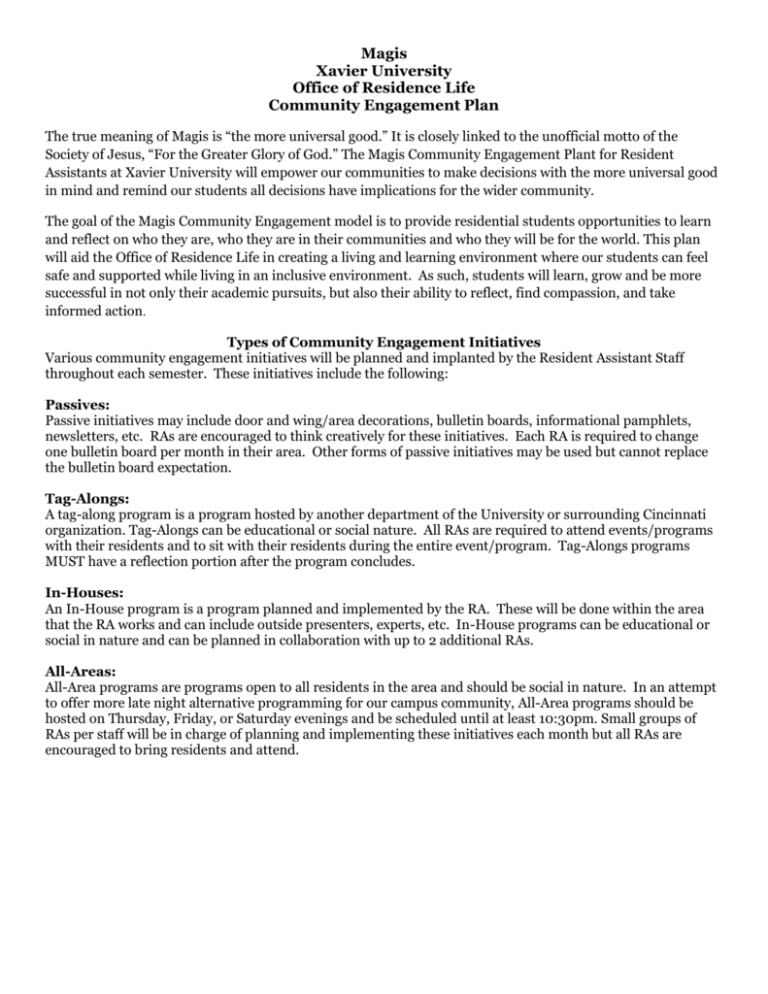
Magis Xavier University Office of Residence Life Community Engagement Plan The true meaning of Magis is “the more universal good.” It is closely linked to the unofficial motto of the Society of Jesus, “For the Greater Glory of God.” The Magis Community Engagement Plant for Resident Assistants at Xavier University will empower our communities to make decisions with the more universal good in mind and remind our students all decisions have implications for the wider community. The goal of the Magis Community Engagement model is to provide residential students opportunities to learn and reflect on who they are, who they are in their communities and who they will be for the world. This plan will aid the Office of Residence Life in creating a living and learning environment where our students can feel safe and supported while living in an inclusive environment. As such, students will learn, grow and be more successful in not only their academic pursuits, but also their ability to reflect, find compassion, and take informed action. Types of Community Engagement Initiatives Various community engagement initiatives will be planned and implanted by the Resident Assistant Staff throughout each semester. These initiatives include the following: Passives: Passive initiatives may include door and wing/area decorations, bulletin boards, informational pamphlets, newsletters, etc. RAs are encouraged to think creatively for these initiatives. Each RA is required to change one bulletin board per month in their area. Other forms of passive initiatives may be used but cannot replace the bulletin board expectation. Tag-Alongs: A tag-along program is a program hosted by another department of the University or surrounding Cincinnati organization. Tag-Alongs can be educational or social nature. All RAs are required to attend events/programs with their residents and to sit with their residents during the entire event/program. Tag-Alongs programs MUST have a reflection portion after the program concludes. In-Houses: An In-House program is a program planned and implemented by the RA. These will be done within the area that the RA works and can include outside presenters, experts, etc. In-House programs can be educational or social in nature and can be planned in collaboration with up to 2 additional RAs. All-Areas: All-Area programs are programs open to all residents in the area and should be social in nature. In an attempt to offer more late night alternative programming for our campus community, All-Area programs should be hosted on Thursday, Friday, or Saturday evenings and be scheduled until at least 10:30pm. Small groups of RAs per staff will be in charge of planning and implementing these initiatives each month but all RAs are encouraged to bring residents and attend. SHADES of Magis: Values Based Programs The following values will be the focus of our educational Community Engagement Plan. Spirituality o These initiatives should be center around spiritual development for the residents, whether introducing religion topics and dialogue or various aspects of personal faith discovery in correlation with our Catholic Jesuit values and mission. Some examples of spirituality initiatives would be attending Sunday Mass with your floor section with reflection afterward, Center for Faith and Justice or Interfaith Community Engagement collaborative program, or guided meditation, etc. Health & Wellness o Academic/Scholarship o These initiatives should encourage an appreciation and an understanding of differences between individual students, but most importantly, the human race. They should engage students in dialogue, experiences, or opportunities to learn, and should be focused on challenging beliefs and pushing students outside of their comfort zone. Initiatives could include taking students to an LGBTQ speaker on campus, taking students to BSA fashion show, encouraging dialogue on the racial tensions in America with a faculty member in your hall, going to Findlay Market and trying a different culture’s foods while passing out information on that culture, or bring in someone from the Center for Diversity and Inclusion to facilitate dialogue on being inclusive to other students while in college. Engagement o Academic/Scholarship initiatives should encourage the students in attendance to be better students and learners in and out of the classroom through engagement opportunities to focus on studying and their academic careers. Examples of these initiatives could include themed study nights, bringing in academic advisors to focus on academic initiatives, creating a study tips bulletin board, passing out information on majors or minors, or even taking students to a play on campus that focuses on the history of America (or anything else educational). Diversity and Inclusion o These initiatives should be centered on any aspect of personal health and wellness for our residents. This can include mental, emotional, social, or physical well-being topics, either preventative or based off of a community need that may arise in your area. Examples of Health and Wellness initiatives include self-defense workshops, fire safety programs, eating disorder awareness information, fitness classes, etc. These initiatives center on the concept of engaging the greater community, specifically in aspects of service. By investing in our communities we develop relationships with others while learning about ourselves and increasing the social capital of the entire campus. These initiatives can be done across wings, halls, campus, or the greater Cincinnati community. Service projects, work off campus, fundraisers, and cross-group competitions are all examples of engagement initiatives. Self-Awareness o These initiatives should help the residents ask and answer questions regarding their identity and the person they wish to become. These can help the residents explore aspects of their identity, explore why they possess the standards and values they do, or how their behavior aligns with standards or values. Some examples of Self-Awareness initiatives would be personality assessments, meditations, career development topics, student development, or overall life lessons. Each RA will be expected to address each of the 6 SHADES values once per semester. If an RA would like to cover two SHADES areas in one semester, approval must be received from their supervisor-this should be limited. Three SHADES programs can be covered through a passive initiative and three can be covered through a Tag-Along or In-House Program each semester. If a SHADES value was covered passively during fall semester, the RA should address the value through a Tag-Along or In-House Program during spring semester. Community Collaboration Expectations: Each of the following are required for each RA Fire Safety Program (Before Oct. 1st) Student Commitment Program (can count as a SHADES program-Before Nov. 1st) One SWAG initiative (Based on area needs, 3 RAs per program per year-can count for SHADES Program) One initiative must include a faculty member (per year) Spontaneous Initiatives: Spontaneous initiatives are just that-spontaneous. These are relatively unplanned outings with members of your community that RAs are doing consistently do encourage community building and build student engagement in their areas. Examples include but are not limited to: Dinners in the cafeteria Playing video games Movies Sports (TV or event) In hall study sessions Muskie to Muskie: Resident/Apartment Check-Ins: 1st Round: Fall weeks 1-6 2nd Round: Fall weeks 7-12 3rd Round: Spring weeks 1-12 Each RA is expected to have an intentional, substantive, and meaningful conversation with each resident (each apartment for Apartments Staff) during the listed time frame. A brief description of each Muskie to Muskie should be recorded. Tracking of these will be done via each Hall Director. We understand some residents are going to be hard to reach; however, this number should be limited. In these cases, record your attempts to reach them if you are unable to make direct connection. This information will be just as important to know for data collection. Suggested Muskie to Muskie Conversation Topics: First Year Students –Round 1 Loneliness/homesickness Initial financial adjustments Family issues Adjustment to living with another person/sharing bathrooms Preconceptions of college life are challenged by day to day reality Finding job/organizations-getting involved Roommate Issues Classes, campus, resources Fears about first paper/exam Experimenting with new freedoms Unhealthy behavior patterns (academic and social) Time Management Committing to a major Upperclass Students- Round 1 Catching up with friends from last year or how to let them go Adjusting to apartment mates Roommate Issues Unhealthy behavior patterns (academic and social) Serving as a Mentor Transfer Students- Round 1 Finding job/organizations Loneliness/homesickness Overwhelmed by campus/new environment Unhealthy behavior patterns (academic and social) Social connections with same-age peers Campus integration First-Year Students- Round 2 Study skills Cliques/Floor divisions Long distance relationships or at-home friendships Roommate tensions Signs of stress Alcohol use/abuse Final exams Class registration Upperclass Students- Round 2 Study Skills Roommate tensions Alcohol use/abuse Procrastination Final exams Becoming over-extended Planning for summer internship applications Signs of stress First-Year Students- Round 3 Housing for next year. Homesickness at beginning of semester changes in roommate agreements Upperclass Students-Round 3 Housing for next year. Changes in roommate agreements Preparing for real world Career services Interview skills Graduation Additional Community Engagement Tools: Roommate/Apartment Agreements Health and Safety Inspections Departmental Surveys Duty Rounds Office Hours Community Engagement Plan At-a-Glance Fall Semester August Opening: Door Decs Opening Bulletin Board Opening Floor/Area Meeting Tag-Along/In-House (social only) Tag-Along/In-House (social only) September: Passive Initiative Tag-Along In-House *2 of the 3 above items should be SHADES focused. Remaining 1 can be social All-Area October: Passive Initiative Tag-Along In-House *2 of the 3 above items should be SHADES focused. Remaining 1 can be social All-Area November: Passive Initiative Tag-Along In-House *2 of the 3 above items should be SHADES focused. Remaining 1 can be social All-Area December Closing: Closing Bulletin Board Closing Floor/Area Meeting Community Engagement Plan At-a-Glance Spring Semester January Opening: Door Decs Opening Bulletin Board Tag-Along/In-House (social only) February: Passive Initiative Tag-Along In-House *2 of the 3 above items should be SHADES focused. Remaining 1 can be social All-Area March: Passive Initiative Tag-Along In-House *2 of the 3 above items should be SHADES focused. Remaining 1 can be social All-Area April: Passive Initiative Tag-Along In-House *2 of the 3 above items should be SHADES focused. Remaining 1 can be social All-Area May: Closing Bulletin Board Closing Floor/Area Meeting
